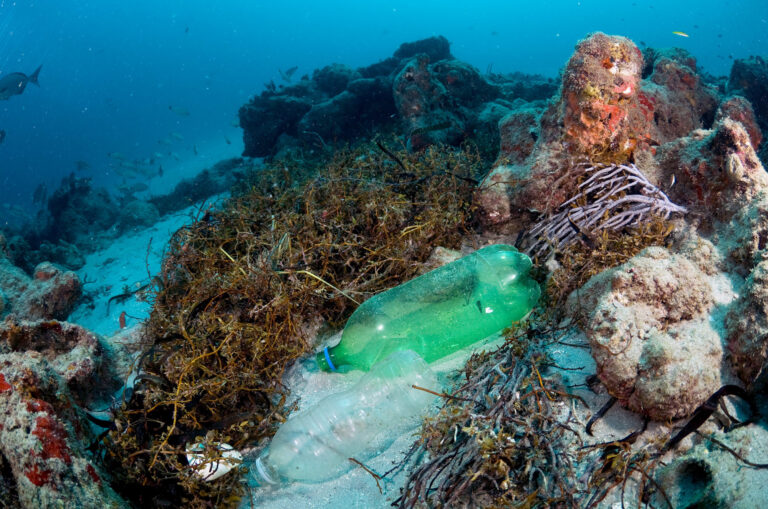Аdvеrtіѕе wіth thе most visited news site in Antigua and Barbuda ~ Wе оffеr fullу сuѕtоmіzаblе аnd flехіblе dіgіtаl mаrkеtіng расkаgеѕ. Yоur соntеnt іѕ dеlіvеrеd іnѕtаntlу tо thоuѕаndѕ оf uѕеrѕ іn Antigua аnd аbrоаd via our One Signal push notifications! Соntасt uѕ аt [email protected].
———————————————————————
Almost all coral reefs – including some of the most remote on Earth – contain large pieces of plastic waste, new research shows.
The study, published in Nature, surveyed 84 shallow and deep reefs at 25 locations across the Pacific, Atlantic and Indian oceans, looking for human-made debris over 5cm in size.
Debris was found at 77 of the 84 reefs, including at near-pristine locations such as uninhabited atolls in the central Pacific.
Most debris was plastic (88%) and almost three quarters of items identified (73%) were fishing gear.
Surprisingly, deeper reefs were more polluted than shallow ones.
The study – by a team including California Academy of Sciences, Nekton and the universities of São Paulo, Oxford and Exeter – is the most comprehensive survey of plastic pollution on coral reefs ever conducted.
“Plastic pollution is one of the most pressing problems plaguing ocean ecosystems, and coral reefs are no exception,” said lead author Hudson Pinheiro, PhD, of the University of São Paulo and an Academy research fellow.
“From plastics that spread coral diseases to fishing lines that entangle and damage the structural complexity of the reef, decreasing both fish abundance and diversity, pollution negatively impacts the entire coral reef ecosystem.”
Luiz Rocha, PhD, co-director of the Academy’s Hope for Reefs initiative, said: “It was surprising to find that debris increased with depth, since deeper reefs in general are farther from sources of plastic pollution.
“We are almost always the first humans to set eyes on these deeper reefs, and yet we see human-produced trash on every dive.
“It really puts the effect we have had on the planet into perspective.”
Comoros, an island chain off the southeast coast of Africa, had the highest density of pollution, with nearly 84,500 items per square kilometre.
Reefs off the Philippines and Brazil were also highly polluted.
The only plastic-free reefs recorded in the study were in the Seychelles Outer Islands – but even here the researchers spotted plastic outside surveyed areas.
Commenting on the scale of debris deep reefs (30-150m), co-author Bart Shepherd, director of the Academy’s Steinhart Aquarium and co-director of Hope for Reefs, said these are “not a refuge for shallow reef species in a changing climate as we once thought”.
He added: “These reefs face many of the same pressures from human society as shallow reefs, and have a unique and poorly studied fauna.
“We need to protect deeper reefs and make sure that they are included in the conservation conversation.”
The researchers found consumer debris such as water bottles and food wrappers, but these were not the main form of plastic pollution at reefs.
Co-author Lucy Woodall, associate professor at the University of Exeter and principal scientist of marine conservation charity Nekton, highlighted the large amount of fishing gear at deep reefs.
This can entangle marine animals in so-called “ghost fishing”.
Professor Woodall added: “Unfortunately, fishing gear debris is often not reduced by general waste management interventions.
“Therefore, specific solutions related to the needs of fishers should be considered, such as no-charge disposing of damaged gear in ports, or individually labelling gear to ensure fishers take responsibility for misplaced equipment.”
The researchers found that reef pollution increased near densely populated cities, local markets, and – counterintuitively – marine protected areas.
Since most marine protected areas allow some fishing within or near their borders and are typically rich in marine life, they are often heavily frequented by fishers.
The research team hope their findings will help direct future conservation efforts.
For example, they stress the need to expand the depth of marine protected areas to include deep reefs.
“The results of our global study shine a light on one of the many threats that deep reefs face today,” said Paris Stefanoudis, from the University of Oxford and research scientist at Nekton.
“Because these ecosystems are ecologically and biologically unique, much like their shallow-water cousins, they need to be conserved and explicitly considered in management plans.”
Shepherd added: “Despite the disturbing overall trend, there were some places where we found relatively little debris, which shows us that there are effective strategies for preventing plastic pollution.
“If we act fast and employ science-based solutions, there absolutely is hope for coral reefs.”
CLICK HERE TO JOIN OUR WHATSAPP GROUP FOR NEWS UPDATES.
Make a donation to help support ABN, via PayPal: [email protected]. Follow Antigua Breaking News on Twitter @ABNAntigua and Instgram @AntiguaBreakingNews and on Facebook. Send us a message on WhatsApp at 1-868-704-9864 or email us at [email protected].
JOIN OUR WHATSAPP GROUP FOR NEWS UPDATES: CLICK HERE.
JOIN OUR WHATSAPP GROUP FOR NEWS UPDATES: CLICK HERE.
JOIN OUR WHATSAPP GROUP FOR NEWS UPDATES: CLICK HERE.
JOIN OUR WHATSAPP GROUP FOR NEWS UPDATES: CLICK HERE.
JOIN OUR WHATSAPP GROUP FOR NEWS UPDATES: CLICK HERE.
JOIN OUR WHATSAPP GROUP FOR NEWS UPDATES: CLICK HERE.
JOIN OUR WHATSAPP GROUP FOR NEWS UPDATES: CLICK HERE.
JOIN OUR WHATSAPP GROUP FOR NEWS UPDATES: CLICK HERE.
JOIN OUR WHATSAPP GROUP FOR NEWS UPDATES: CLICK HERE.
JOIN OUR WHATSAPP GROUP FOR NEWS UPDATES: CLICK HERE.
JOIN OUR WHATSAPP GROUP FOR NEWS UPDATES: CLICK HERE.
JOIN OUR WHATSAPP GROUP FOR NEWS UPDATES: CLICK HERE.
















